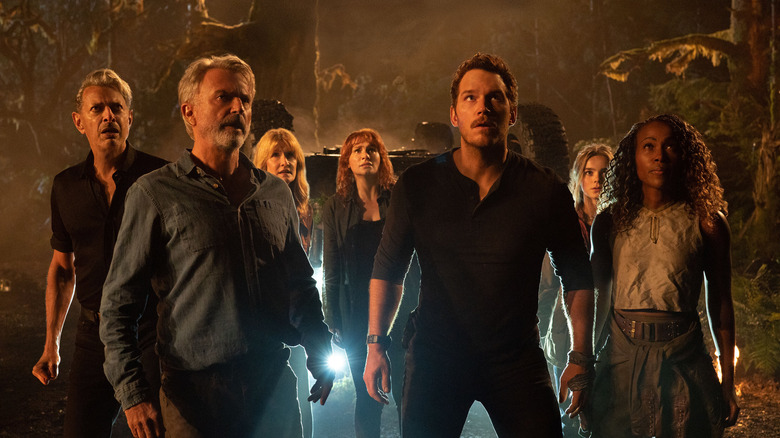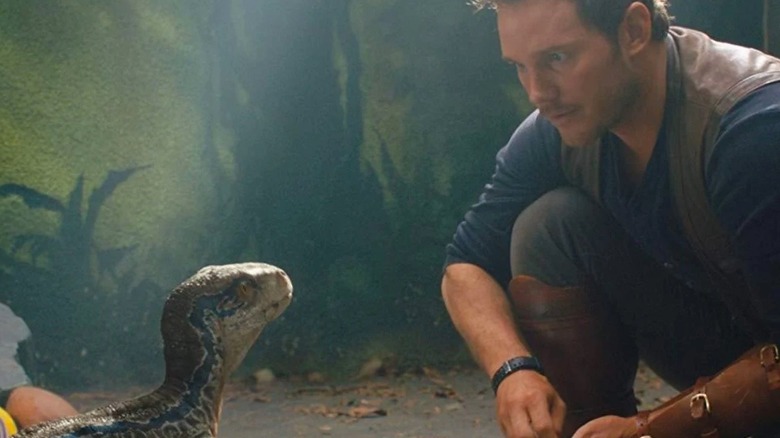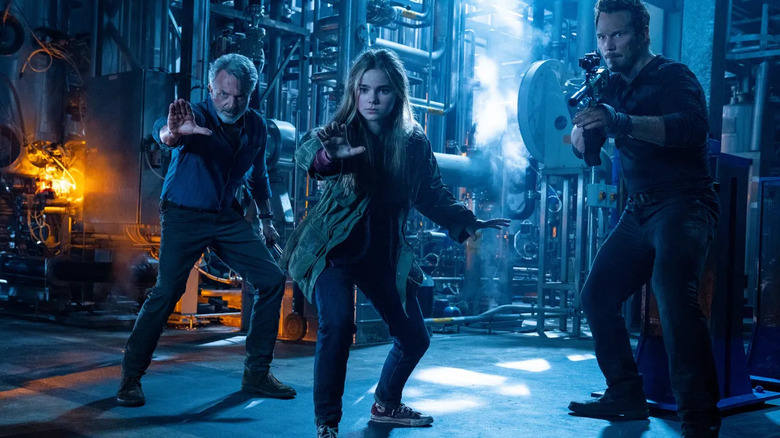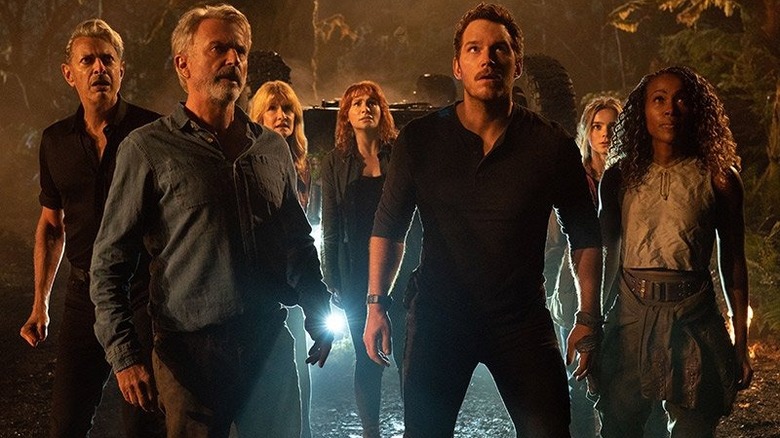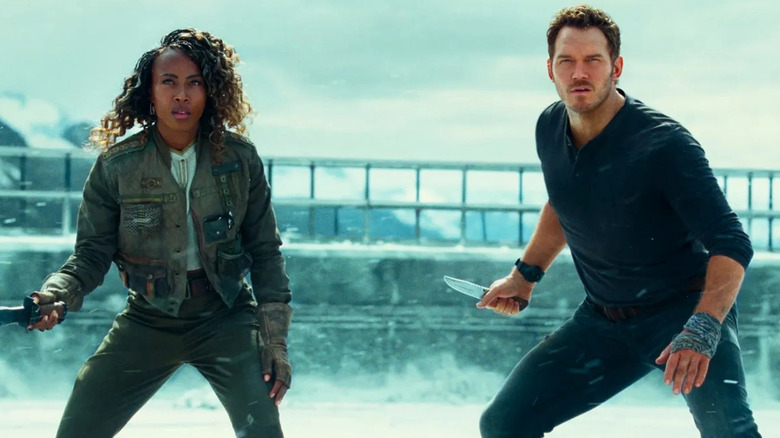Jurassic World Dominion Ending Explained: Life Finds A Way, Again
(Spoiler warning: This article will openly discuss plot elements of "Jurassic World Dominion")
J.A. Bayona's 2018 film "Jurassic World: Fallen Kingdom" ended with the implication that dinosaurs, now free to roam the world, will, perhaps chillingly, infiltrate a human-controlled Earth and take their rightful spot at the top of the food chain. Colin Trevorrow's "Jurassic World Dominion," now out in theaters, scales back the previous film's promised threat by depicting a near future where dinosaurs have weirdly assimilated into human spaces without much in the way of mayhem; occasionally a pterosaur will nest at the top of a skyscraper, but there are no reports of, say, a brachiosaurus knocking over buildings or velociraptors infiltrating the U.N. Building (now that would be a movie!). The worst that has happened is a budding dinosaur black market where animals are traded for insidious purposes (as attack monsters, as exotic meats, etc.).
A global biological crisis arises, and humanity's response is to merely shrug and mutter "I guess we'll just have to learn to live with it." Surely, "Jurassic World Dominion" is a post-Covid film writ large.
The locusts
It's only been a few years — merely long enough for the character of Maisie Lockwood (Isabella Sermon) to grow into a teen — but the dinosaur problem seems to be well in hand. Many of the escaped dinos are now contained within a remote, secluded valley controlled by a shady genetics corporation that keeps the animals in line with poorly-explained brain implants (scientists can herd dinosaurs remotely from a techno-lab miles away). As with every "Jurassic Park" movie, those who would seek to control nature — or merely make a profit from it — are the film's worst villains. The reader will be awarded no points for guessing that uppance will surely come for the sleazy, DNA-tinkering CEO (Campbell Scott).
The plot of "Dominion" will involve not dinosaurs but genetically engineered 18-inch-long locusts that — by dint of their size, appetite, and ability to copiously reproduce — pose a grave and immediate threat to the world's food supply. Ellie Sattler (Laura Dern) is made privy to the fact that the locusts will not eat crops grown from GMO seeds provided by Campbell Scott's vaguely sinister BioSyn corporation. She will have to team up with Alan Grant (Sam Neill) and Ian Malcolm (Jeff Goldblum) to break into the corp, see if there are locusts there, extract some of their DNA (if there are), and bring the evidence to the press. It perhaps strikes a note of hubris that Ellie assumes an evil corporation will cease their destructive tinkering after the news uncovers their malfeasance, but it's nice to assume she will save the day.
Dr. Henry Wu's redeption
The machinations of the film (and "Dominion" is an everything-and-the-kitchen-sink, globe-trekking adventure story) will eventually bring the "Jurassic Park" protagonists together with the "Jurassic World" protagonists (Bryce Dallas Howard, Chris Pratt, and newcomer DeWanda Wise) and find them all lost in the above-mentioned dinosaur preserve fighting for their lives against attacking mega-carnivores: The new apex predator is a giganotosaurus, a creature bigger and meaner than a tyrannosaurus rex. While they fight, espionage inside BioSyn will see the lab itself start to (literally) go up in flames while the Campbell Scott character cowardly attempts to flee.
Also present at BioSyn is Dr. Henry Wu (B.D. Wong), who has appeared in more "Jurassic" movies than any other character. He was one of the chief bioengineers at Jurassic Park, and it was his tinkering in the "World" films that made more dangerous dinosaurs. It was also his work that allowed for the creation of Maisie, herself a human clone (disappointingly, Maisie was not spliced with dinosaur DNA, so audiences must continue to wait for their dino-person movie). Dr. Wu was also the one who helped develop the killer locusts, and — out of guilt — wishes to undo his work by introducing a genetic sterilization element into their population. Despite all the adventure and dinosaur mayhem, most of "Dominion's" focus will be on those locusts.
The lesson learned...
Sattler's investigation into locusts, and Dr. Wu's need to sterilize them, point to the central theme of "Dominion": The danger of invasive species.
Often instigated directly by humans, or by changing environmental circumstances (brought about by humans), invasive species are, as their name implies, animals that infiltrate a neighboring biome and profligate quickly, using up food, eating new prey, or simply muscling out and killing the local population. An invasive species can be anything from rats, to toads, to even viruses, plants, and bacteria. Such species can threaten the biodiversity of a local environment and threaten native wildlife.
The locusts in "Dominion" are, thanks to genetic tinkering, the ultimate invasive species, capable of attacking and wiping out crops at a speed heretofore unseen in history. A character in "Dominion" easily recognizes the Biblical parallel. Dr. Sattler's quest to stop the locusts is based on survival, but for Dr. Wu is far more personal: Stopping the locusts is penance. It's the character undoing a mistake. The plot will provide at least one character with redemption. Once the locusts are handled (Dr. Wu releases a single sterilization-equipped, genetically engineered locust into their ranks), audiences can rest assured that humanity will no longer toy with the very fabric of life ever again. After six movies, countless deaths, trillions of lost dollars, and the threat of a Biblical apocalypse, perhaps Dr. Wu's final realization can be humanity's as well.
The lesson forgotten...
That lesson — not to mess with Mother Nature — and "Dominion's" central theme to beware invasive species is largely undone, sadly, by its own brief epilogue. In a half-assed attempt to tie up "Dominion" with a vague message of unity and togetherness, the filmmakers included a montage of dinosaurs assimilating with Earth's native animal population (they swim with dolphins, run with horses, fly with the birds), all presented in calming, gorgeous, beatific shots that wouldn't have felt out of place on a museum-gift-shop postcard.
This final message of dinosaurs being biologically copacetic with the modern world stands counter to everything "Dominion" attempted to communicate, but also stands counter to what the entire "Jurassic" franchise is about. Ian Malcolm warned that the natural world was being strip-mined and that introducing extinct animals back into the world millions of years after their demise will only lead to trouble. For six films, audiences have seen that trouble firsthand. It's not wise to make dinosaurs and let them run amok. It will lead to chaos.
A final IMAX-friendly montage of peaceful cretaceous critters is the opposite of "Jurassic's" warnings. "Dominion" foolishly declares that dinosaurs are peaceful and that nature will simply welcome them. After a movie explicitly stating how devastating that would be, it's quite an odd sentiment to go out on.
